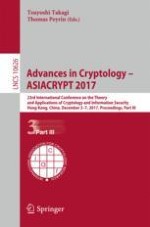2017 | OriginalPaper | Buchkapitel
Non-Interactive Multiparty Computation Without Correlated Randomness
verfasst von : Shai Halevi, Yuval Ishai, Abhishek Jain, Ilan Komargodski, Amit Sahai, Eylon Yogev
Erschienen in: Advances in Cryptology – ASIACRYPT 2017
Aktivieren Sie unsere intelligente Suche, um passende Fachinhalte oder Patente zu finden.
Wählen Sie Textabschnitte aus um mit Künstlicher Intelligenz passenden Patente zu finden. powered by
Markieren Sie Textabschnitte, um KI-gestützt weitere passende Inhalte zu finden. powered by
